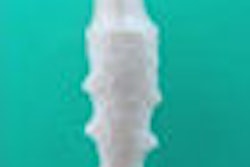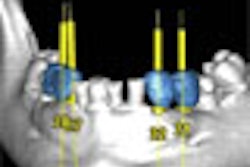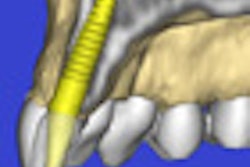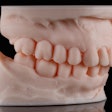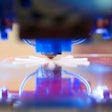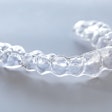Fixed-partial titanium dentures fabricated using CAD/CAM technology demonstrated good reliability after three years, although there was some risk of porcelain fractures, according to a study in the Journal of Prosthodontics (August 16, 2010).
"There is lack of knowledge about the clinical performance of CAD/CAM titanium-ceramic-fixed partial dentures (FPDs)," noted the researchers, from Martin Luther University of Halle-Wittenberg and Louisiana State University. "The purpose of this study was to evaluate CAD/CAM titanium-ceramic FPDs after three years in function."
They fabricated 31 FPDs for 23 patients. The titanium frameworks were completely fabricated using CAD/CAM technology, and the low-fusing porcelain was veneered. After confirming there were no mechanical or biological complications, the researchers cemented the FPDs using zinc phosphate cement.
The patients were recalled at 12, 24, and 36 months after cementation to look for any mechanical complications, such as fractures of the veneering porcelain or the supportive framework, or biological complications, including caries, gingivitis, or periodontitis.
The researchers found four cohesive and three adhesive porcelain fractures but no framework fractures. The Kaplan-Meier cumulative success rate of the CAD/CAM titanium-ceramic crown with regard to mechanical complications was 76.4%, and the cumulative survival rate was 96.8% after three years of use. One patient developed caries, but the condition was not associated with marginal discrepancy. No other biological complications were reported.
"The CAD/CAM titanium-ceramic FPDs survived in the mouths of patients without major complications for three years, although the risk of porcelain fracture appeared to be relatively high," they concluded.
Copyright © 2010 DrBicuspid.com




